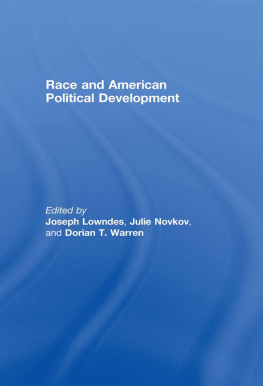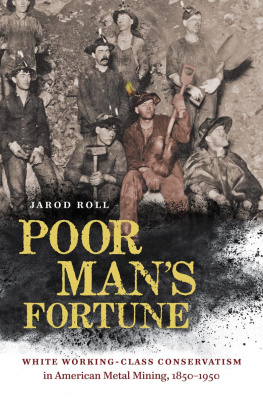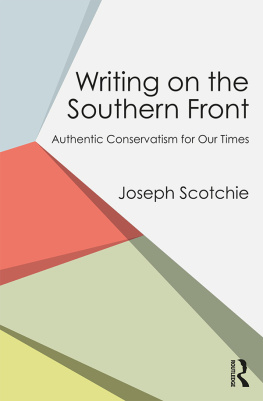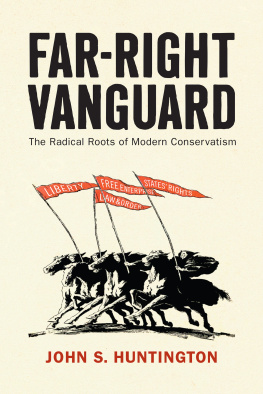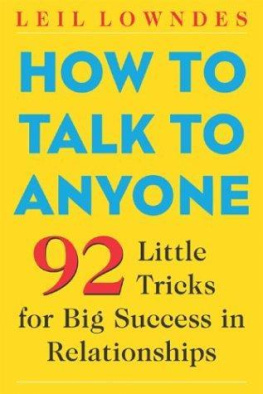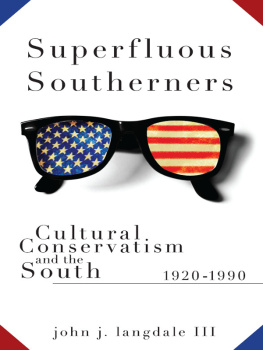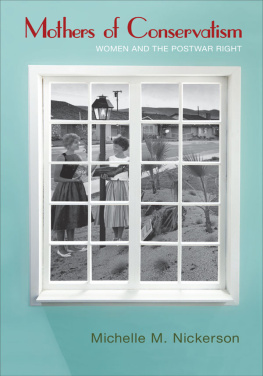FROM THE NEW DEAL TO THE NEW RIGHT
FROM THE NEW DEAL TO THE NEW RIGHT
Joseph E. Lowndes
RACE AND THE SOUTHERN ORIGINS
OF MODERN CONSERVATISM

Published with assistance from the Kingsley Trust Association
Publication Fund established by the Scroll and Key Society of
Yale College.
Copyright 2008 by Yale University.
All rights reserved.
This book may not be reproduced, in whole or in part, including
illustrations, in any form (beyond that copying permitted by
Sections 107 and 108 of the U.S. Copyright Law and except by
reviewers for the public press), without written permission from
the publishers.
Set in Galliard type by The Composing Room of Michigan, Inc.
Printed in the United States of America by Thomson-Shore, Inc.,
Dexter, Michigan.
Library of Congress Cataloging-in-Publication Data
Lowndes, Joseph E., 1966
From the New Deal to the New Right : race and the southern
origins of modern conservatism / Joseph E. Lowndes.
p. cm.
Includes bibliographical references and index.
ISBN 978-0-300-12183-4 (cloth : alk. paper) 1. United States
Race relationsPolitical aspectsHistory20th century.
2. RacismPolitical aspectsUnited StatesHistory20th
century. 3. Southern StatesRace relationsPolitical aspects
History20th century. 4. RacismPolitical aspectsSouthern
StatesHistory20th century. 5. ConservatismUnited
StatesHistory. 6. Republican Party (U.S. : 1854)History
20th century. 7. United StatesPolitics and government
20th century. 8. Southern StatesPolitics and government
20th century. I. Title.
E743.L59 2008
973.91dc22
2007044683
A catalogue record for this book is available from the British
Library.
The paper in this book meets the guidelines for permanence and
durability of the Committee on Production Guidelines for Book
Longevity of the Council on Library Resources.
10 9 8 7 6 5 4 3 2 1
For Priscilla,
and for Benjamin and Adam
CONTENTS
2 White Supremacy Is a Political Doctrine:
Charles Wallace Collins and the Dixiecrat Revolt of 1948
3 Goldwater Was the Horsepower: National Review
and the New Southern GOP
4 You Are Southerners Too: The National Campaigns
of George Wallace
5 The South, the West, and Suburbia: Richard Nixons
New Majority
6 Guvmints Lie: Asa Carter, Josey Wales, and the
Southernization of Conservatism After Watergate
7 Between Political Order and Change: The Contingent
Construction of the Modern Right
ACKNOWLEDGMENTS
I was fortunate enough to have many people read parts or all of this book along the way. Members of my writing group in New York, including Jessica Blatt, Kevin Bruyneel, Cat Celebrezze, Mike Diamond, Edmund Fong, Susan Hibbard, Ron Krabill, Priscilla Yamin, and Bill Winstead, were all helpful in shaping the manuscript. Of this group, I especially thank Kevin, Cathy, Edmund, and Priscilla, who read and commented on numerous drafts of every chapter from its inception. To this list I must add Nancy Wadsworth, who acted as an honorary member of the group while in Denver and Ithaca.
I could not have asked for a better adviser in this project than Victoria Hattam. Vicky continually encouraged me to follow my own inclinations in this project, regardless of the conventional constraints of the political science discipline. She acted as a good critic as well, and thereby made this a far better and more interesting book than it would have been otherwise. I have benefited immensely from her wide-ranging intellectual interests and egalitarian spirit. George Shulman was an important source of insight and support throughout. He pushed me to resist simple answers to complicated questions, and to stay focused on the fundamental questions that I was asking. Adolph Reeds lucid insights about racial and class politics in the United States were invaluable, and his encyclopedic knowledge of southern politics and history helped to point me toward many sources I would have otherwise neglected. David Plotke, always a conscientious reader, helped me clarify my arguments and rein them in when they threatened to gallop off in every direction. Ira Katznelson was generous with his time throughout, and I am grateful to him for turning his considerable intellect toward my project, always offering fruitful suggestions on framing and organization, as well as argument.
My understanding of the relationship of discourse and politics was helped enormously by a long-standing study group on that theme, which intersected with a larger workshop on identification and politics organized by Vicky Hattam and Ernesto Laclau, which held two meetings: once at the New School for Social Research in New York City, and once at the Committee on Ideology and Discourse Analysis at Essex University, Colchester, UK. This larger group included Glenn Bowman, Jason Glynos, David Howarth, Courtney Jung, the late Deborah Mitchell, Anne Norton, Aletta Norval, Francisco Panizza, Yannis Stravakakis, and Linda Zerrilli.
Other fora provided important opportunities for me to present parts of this project, including the New York American Political Development Colloquium, the Re-thinking African American Politics Summer Seminar at the University of Chicago, and panels at the American Political Science Association, the Northeast Political Science Association, and the Western Political Science Association.
Daniel Delaney, Stephen Duncombe, Mustafa Emirbayer, Andrew Grossman, Grrrt, Ronald Hayduk, Catherine Holland, Simon Hollis, Joseph Luders, Joel Olson, Andrew Polsky, Thaddeus Russell, Jacob Slichter, Stephen Skowronek, and Philip Triadafilopoulos all read parts of this book and offered useful comments and criticisms along the way. My colleagues at the University of Oregon Gerald Berk, Leonard Feldman, and Julie Novkov read the manuscript in its later stages and were invaluable interlocutors. I received research assistance from Sverre Bodung and Jennifer Hehnke, and I owe a great debt of gratitude to Adrienne Van der Valk for her extraordinary efforts to bring this manuscript to finished form.
I am grateful to my editor at Yale University Press, Keith Condon, who saw potential in this book and whose enthusiasm for it was a much-needed buoy at times. I also want to thank Noreen OConnor, whose keen eye has made this a more readable book.
I was assisted by a number of archivists in this project: Norwood Kerr and Nancy Dupree at the Alabama Department of Archives and History; Jim Baggett at the Birmingham, Alabama, Public Library; Stephanie Adams, Alan Burns, and James Cross at Clemson University; Jennie Levine at the University of Maryland Archives; Sam Rushay of the Nixon Presidential Materials at the National Archives and Records Administration.
A version of in its original form appeared in International Journal of Politics, Culture and Society, 16, no. 2 (Winter 2002), and appears here with permission.
My ability to complete the book depended on numerous sources of support. They include the New School University Fellowship; the Elinor Goldmark Black Fellowship for Advanced Studies in the Dynamics of Social Change; the Mellon Foundation Dissertation Fellowship at the University of Chicago; and the Junior Professorship Award, New Faculty Award, and the Colligan Award for Political Science Faculty, all from the University of Oregon.
My father was a great resource for this project. As a southerner whose adult life has covered the historic span of this study, he provided keen insights and observations, even if we differ on many of the conclusions. My mother, the late Kathleen Flynn, was always a sharp and humorous critic of the Sunbelt South in which she found herself. Much of how I interpreted my surroundings as a child came through her eyes. Finally, I thank my partner, Priscilla, and my two children, Benjamin and Adam, who continually remind me of surprises and possibilities that life holds.
Next page

